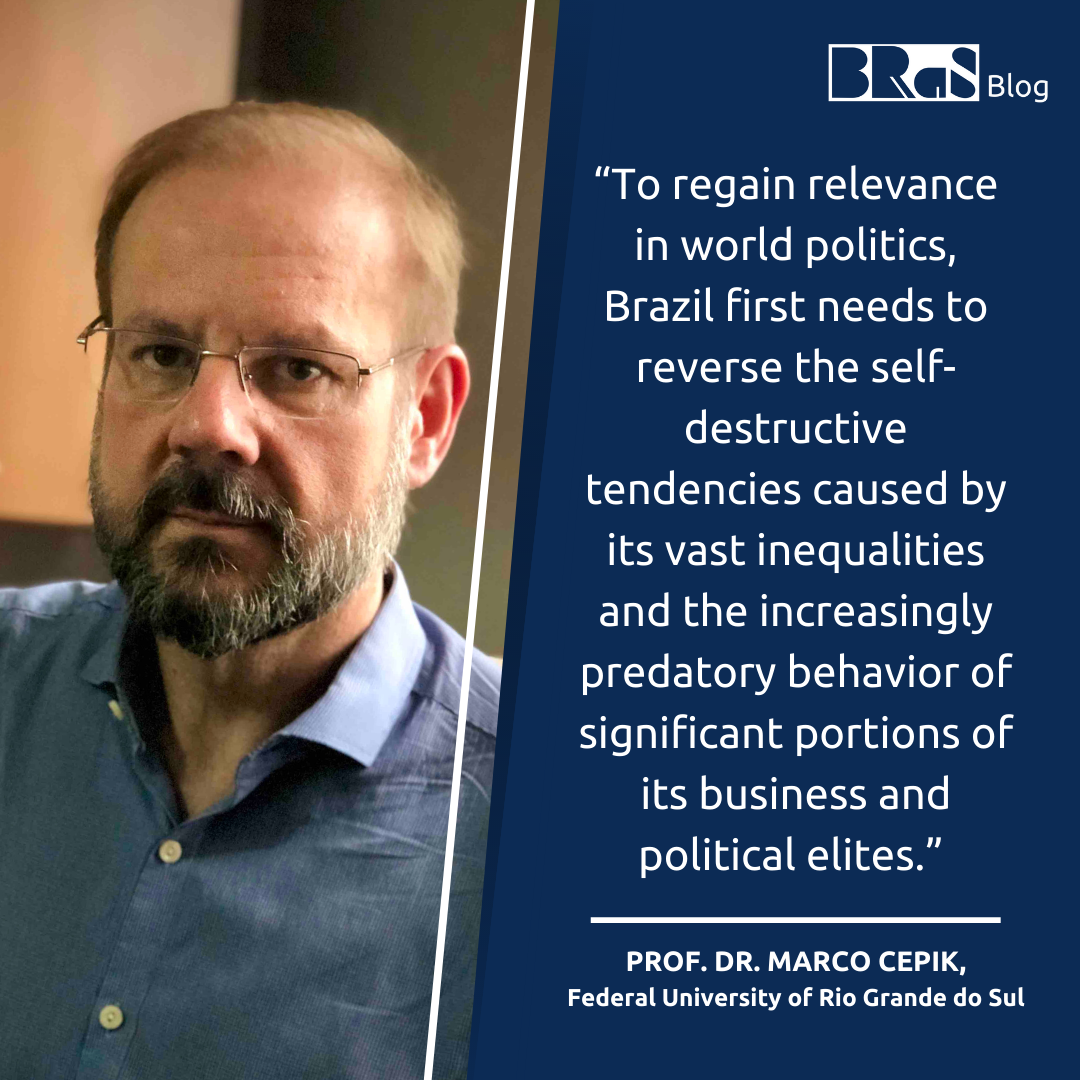by Mariana Beselga and Matheus Lobo Custódio Duarte Maia
Edited and reviewed by Matheus Lucas Hebling
A year ago, in March 2020, the health crisis caused by the new coronavirus officially reached the Brazilian territory, amplifying the current scenario of political and juridical instability in the country. This is certainly the most critical moment experienced by Brazilian democracy since the end of the dictatorial regime.
The main fact of this troubling scenario is the electoral culmination of the extreme right’s axiology and praxeology in the Federal Executive Branch, thus boosting the process of corrosion of institutions. The greatest example of this is the fact that Brazil was the 4th country in the world to lead a democratic setback in 2020, permeating the status of electoral democracy in transition to electoral autocracy.
Moreover, it is possible to verify the relationship between the damage to fundamental rights engendered by the resounding failure of the federal government’s health management, given the crisis caused by COVID-19, and the autocratization process in full force in the Brazilian State, which consists of the concentration of power in the figure of a legally elected leader, but who does not show real commitment to the agreed norms and provisions of the Citizen Constitution. Thus, to explain this relationship, the concepts of biopower and governmentality theorized by Michel Foucault (1981; 1988) will be used.
Foucault’s analysis is guided by a transformation from an administrative State, enveloped by technological apparatus and discipline, to a State of governmentality; as articulated around biopower, thus affirming the legal power over life. Given this, it becomes possible to certify that population control is not only targeted at the ideological aspect but as a body, as a biopolitical reality, within the legal instrument itself (Deleuze & Hand, 2016).
Consequently, biopolitics consists of government segments that directly regulate laws, health, and other institutions in society, articulating normative standards on life and death. In Foucault’s conception, biopower is two-dimensional, as it can be used as a form of commitment to the maximization of the population health, as well as an instrument of punishment and coercion from rulers to the ruled, constituting the repressive characteristics intrinsic to the Western models in its post-capitalist phases, known as the modern liberal state.
Health Management and biopolitics
Based on the definition conceived by Foucault (2008) about the phenomenon of governmentality, in other words, the process of origin and consolidation of the entity called government, which consists of the articulation between the saber (economy and politics), instruments (security device) and the population – the object for which he works –, noting that a Brazilian society, through the constituents of 1988, opted for the democratic governmentality model when adopting the Democratic State of Law.
The governmentality of modern liberal states is exercised from the execution of biopolitics, that is, through a control technique characterized by its fragmented incidence on the population’s body and life, through the normative framework, based on knowledge and practices, of a given society. In the Brazilian case, this would be exercised through its legal system, which regulates the individual’s daily life – both in the public and private spheres. Thus, in the context of biopolitics applied in compliance with Brazilian democratic governmentality, to be a citizen is to live in such a way as to enjoy the rights and duties outlined in the constitutional text.
The CF/88, in article 196, establishes health as a Fundamental Right of all citizens, as well as, consequently, imputes to the State the duty to, through public policies, promote actions that reduce the risk of diseases and grant access universal to health recovery, protection, and promotion programs. In article 37 of CF/88 determines that the performance of the administrative function of the State, by the Public Administration, in the execution of this duty – and all others within its competence – will have the obligation to occur in compliance with the principles of Legality, Impersonality, Morality, Advertising, and Efficiency.
In this sense, in a constitutional paradigm, the achievement of this responsibility outlined in the aforementioned article implies health management that meets the social, economic, and political agenda converging with the pact signed in 1988, that is, a health policy by which the people are in the active and passive pole of this relationship, which is the creator and receiver, thus materializing the main premise of a Democratic State of law: popular sovereignty, by which all power emanates from the people.
However, about the current pandemic scenario, reality demonstrates a glaring disharmony between the performance of the Executive Power and what was established in the constitutional text, otherwise, what was observed was the federal government, based on autocratic governmentality, to promote biopolitics that violates constitutional norms in the process of confronting COVID-19.
Initially, the Federal Executive Branch denied the danger of the virus and consequently adopted discourses and practices that boycotted the precautionary measures advocated by the WHO, namely social isolation and the use of masks. Later, contrary to what was indicated by world institutions of notorious medical, biological and pharmacological knowledge, he prescribed drugs without proof of efficacy in terms of the treatment and prevention of the infection. Finally, it promoted and endorsed the anti-vaccine discourse, which materialized in the initial refusal to purchase immunization agents here and the subsequent delay in the national vaccination campaign.
The results of such policies are disastrous. According to a report prepared by the Lowy Institute, Brazil is the country with the worst health management in the world, in addition to being, according to Our World in Data, the country with the highest number of deaths and confirmed cases, having presented in the last report (05/08/2021) of the Ministry of Health, the total of 29,985,817 cases and 558,432 confirmed deaths. Thus, given the announced tragedy, the senators, representatives of the Brazilian people, set up a Parliamentary Inquiry Commission to investigate the illegalities practiced by the Brazilian Government during the confrontation of the sanitary crisis, consequently, forwarding the report with its conclusions to the Public Ministry or the General Counsel of the Union, to promote the civil and criminal responsibility of the offenders or to adopt other legal measures.
Final Considerations
Accordingly, the Bolsonaro government adopted a series of ideological and practical postures as the instrumentalization of biopower, representing sober power and the production of bare lives, which expresses ‘the killing and unexpandable life of the homo sacer ‘ in Agamben’s view. For this, it uses the denial of scientific knowledge, depreciation of institutions, and the press, extending to issues related to human rights.
The CPI, still in progress, what has been observed is the practice of numerous crimes of responsibility by the leader of the Executive Branch, in compliance with the hypotheses provided for in the Liability Crimes Law and the Federal Constitution, which are provided for: (i) attacking health, exercising political, individual and social rights. Emphasizing that health is one of the fundamental social rights provided for in the Constitution (Law 1.079/50, art. 4, item III, and art. 7. CF.88: art. 85, item III); (ii) violating the laws and judicial decisions, the position of the Public Administration is highlighted here, innumerable times violating the principles provided for in art. 37 of the Constitution: impersonality, publicity, efficiency, administrative morality and legality (CR.88: art 85, item VII); (iii) proceed in a manner incompatible with the dignity, honor, and decorum of the position (Law 1.079/50, art. 9, item VII).
The impasses generated by the Federal Government, specifically the lack of leadership in quickly countering the dimensions of the health crisis in the country, had a direct impact on the increase in inequality and poverty in geographic regions, increasing the social vulnerability index by combining economic, political and health crises, which affected the guarantee of basic rights of marginalized social groups.
Therefore, such governmental attitudes contributed to the loss of thousands of Brazilian lives, covering the lethality of biopower in its last instance, configured as a modern state of exception through a legal conflict (Agamben, 2004). Both in the international and national order, the Bolsonaro government’s crimes against humanity are verifiable, through practices contrary to the effective management of the health crisis, with corrupt purposes and in contrast to the restrictive measures to contain the virus adopted by the international health agencies.
Mariana R. S. Beselga holds a BA in International Relations from the University of Coimbra. She’s a volunteer in the HeForShe Portugal movement. Her main topics of interest include Political Science, International Political Economy, International Law and Security.
Matheus Lobo Custódio Duarte Maia is a BA student of Law at the Pontifical Catholic University of Minas Gerais. Matheus’s main topics of interest are Philosophy of Law, Social Sciences and Public Law (Constitutional, Financial and Administrative).
References
Agamben, G. (2010). Homo Sacer (pp. 155-158). UFMG.
Agamben. G. (2004). O estado de exceção (pp. 13-15). Boitempo.
Bragnon, R., & Arcanjo, D. (2021). Veja 23 situações em que Bolsonaro pode ter cometido crime de responsabilidade. Folha de S.Paulo. Retrieved 31 July 2021, from https://www1.folha.uol.com.br/poder/2021/01/veja-23-situacoes-em-que-bolsonaro-pode-ter-cometido-crime-de-responsabilidade.shtml?origin=folha.
Deleuze, G., & Hand, S. (2016). Foucault (p. 135-148). University of Minnesota Press.
Duque, D. (2021). Pobreza e desigualdade aumentam de novo: PNAD Covid mostrou impacto do Auxílio Emergencial nos indicadores sociais | Blog do IBRE. Blogdoibre.fgv.br. Retrieved 1 August 2021, from https://blogdoibre.fgv.br/posts/pobreza-e-desigualdade-aumentam-de-novo-pnad-covid-mostrou-impacto-do-auxilio-emergencial-nos.
Foucault, M. (1988). História da sexualidade I (13th ed., p. 155). Graal.
Foucault, M. and Senellart, M. (2008). Segurança, território, população. Martins Fontes.
Foucault, M. (1981). A Microfísica do poder (2nd ed., p. 47-48). Graal.
FUNDAÇÃO OSWALDO CRUZ. (2020). A gestão de riscos e governança na pandemia pela COVID-19 no Brasil: análise dos decretos estaduais no primeiro mês: relatório técnico e sumário executivo (pp. 5-20). Rio de Janeiro: CEPEDES/ENSP/Fiocruz. Retrieved from https://www.arca.fiocruz.br/handle/icict/41452
Tilly, C., Ardant, G., & Bayley, D. (1975). The Formation of National States in Western Europe. Princeton University Press.
V-Dem Institute. (2021). Autocratization Turns Viral (pp. 19-20). Gothenburg: V-Dem Institute. Retrieved from https://www.v-dem.net/media/filer_public/74/8c/748c68ad-f224-4cd7-87f9-8794add5c60f/dr_2021_updated.pdf
Maia, Mariana R. S. Beselga and Matheus Lobo Custódio Duarte. 2021. "Governmentality, biopower, and the attack on fundamental rights in Brazil during the COVID-19 pandemic". Brazilian Research and Studies Blog. ISSN 2701-4924. Vol. 2 Num. 2. Available at: https://www.bras-center.com/governmentality-biopower-and-the-attack-on-fundamental-rights-in-brazil-during-the-covid-19/, accessed on: April 19, 2025.







